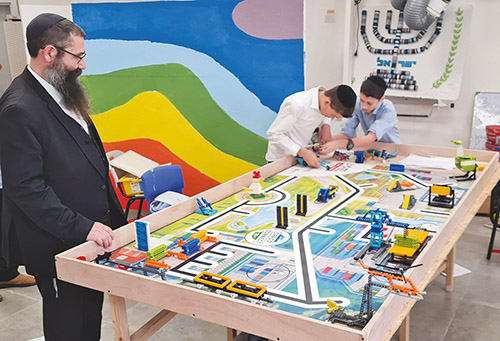



Charedi education in Israel celebrated another landmark recently when the Netzach primary school in Bet Shemesh did outstandingly well in Israel’s national Lego League Robotics Challenge.
Netzach Educational Network CEO Rabbi Menachem Bombach said: “My dream is to show Charedi children and families that they can retain their Charedi identity and values, while being fully part of Israeli society. Our participation and success in this competition is a perfect example of how we are succeeding in this.”
Reaching children as young as third grade, the FLL (First Lego League) is a year-long after-school enrichment program that trains and nurtures elite teams of children in numerous countries around the world, including Israel.
Under the supervision and training of coaches—students from the fields of engineering and computer science—the children undergo a series of engineering challenges, culminating in the competition to build a robot that can carry out specific tasks.
The Jewish Link spoke with two pioneers in Charedi education in Israel: Rabbi Menachem Bombach, founder of the Netzach Educational Network comprising 10 schools throughout Israel, and Rabbi Shaul Miller, principal of the Netzach Yisrael Boys’ School in Bet Shemesh.
Established in 2017, Netzach is Israel’s only ultra-Orthodox (Charedi) network of educational institutions (elementary through post-high school). Their mission is to provide students with an outstanding Charedi education and also a bagrut (matriculation) certificate, which is a prerequisite for higher education in Israel. These studies include mathematics, English, the sciences and civics, for both elementary and high school students.
The network’s vision is to empower graduates to create a strong, financially viable future for themselves, their future families and the Israeli economy, while remaining strongly connected to their core values of Torah observance.
In addition to an outstanding education, the goal of Netzach is to mold students into well-rounded individuals. Instilled with a sense of civic awareness and acquiring new life skills, each individual student obtains tools that will help them conduct themselves with grace and respect, giving them the advantage of integrating more easily into all situations.
Today, the growing Netzach network of 10 schools serves 1,250 students, and fully expects to be serving 1,500-1,800 within two years, not including over 12,000 registered at their Eshkolot Virtual School.
Rabbi Bombach told The Jewish Link: “We are living in a new, different world, facing new challenges and new experiences. Social media, science and innovation means that our kids—even the most Charedi—are all exposed to technology.
“We have to integrate our children into this new reality. Being Charedi does not mean they can’t benefit from what the world has to offer. In fact, the opposite is true: We need to embrace all these new opportunities which Hashem has provided for our personal and spiritual growth.”
Rabbi Bombach said: “We believe you can stay Charedi and be fully integrated in Israeli society. We are opening more and more schools, and we have thousands of kids registering. For me, Gemara and Chumash, English and math share equal importance in all of our schools, and our students excel in each subject.
“I see my role as integrating our Charedi kids into these fields. These robotics competitions give them the motivation to learn. The kids really enjoyed taking part in the competition. They applied the four C’s—creativity, critical thinking, communication and the need to cooperate and work with each other.
“The Netzach school did unbelievably well in the competition—it was a big celebration for the school and the wider community.”
The Netzach elementary school in Bet Shemesh opened in 2018. It already has 300 students and, according to the Education Ministry, it is one of the top schools in the country.
School Principal Rabbi Miller is extremely proud of his robotics team, not just for their achievements but for what it says about the school as a whole.
“At Netzach Yisrael we have a broad curriculum of Torah learning and secular subjects, and we also offer a wide range of after-school activities to encourage the students to discover their talents. Whether it is music or sport, art or electronics, we want them each to develop skills that they enjoy.
“60% of the boys in the school made aliyah to Israel with their families, and that creates challenges for all of us. We find that extracurricular activities like robotics encourage the students to channel their interest in technology, and to find solutions to problems by working together as a team.”
The school robotics group involves 30 boys aged between 8 and 14, and it has been running for three years. The competition requires them to create a robot that can carry out multiple tasks quickly and efficiently, and the boys worked throughout the year on getting their robot to perform better. The competition team was made up of 12- and 13-year-olds from the group, together with their coach, Yitav Coriat.
“I’m thrilled that they were able to demonstrate to themselves and to their friends that Netzach Yisrael students can compete on equal terms with any kids their age in Israel,” Coriat said.
The Charedi sector in Israel has much to contribute to general Israeli society, and Israelis have much to learn from them. The success of the Netzach school in the robotics competition is yet another example of how Charedim, like any other sector, can be integrated and excel in all areas of life in Israel.
By Benjy Singer










